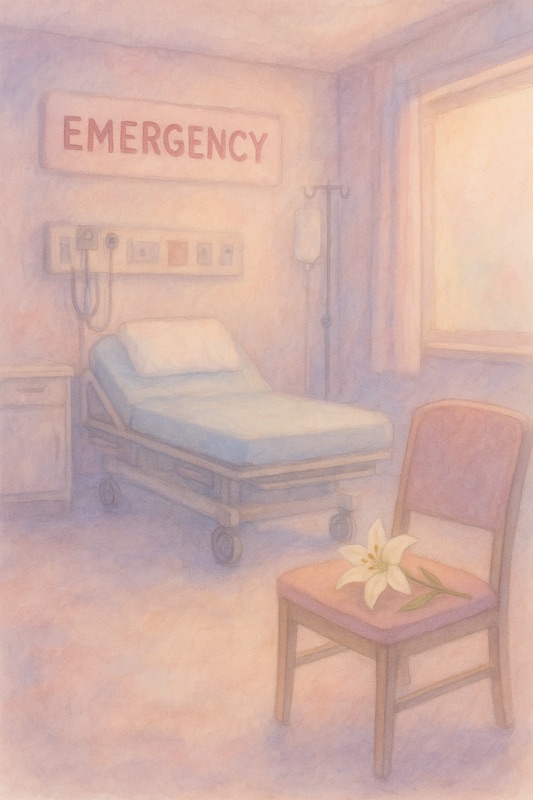
Trigger Warning:
This post discusses medical trauma and the loss of a child. Please take care while reading.
A Sudden ER Visit Triggered a Wave of Grief
Last week, I had to take my husband to the emergency room. Thankfully, he’s okay. But as I sat in that familiar waiting room under fluorescent lights, surrounded by the quiet hum of machines and the coldness of hospital chairs, something inside me broke open.
I was no longer in the present—I was back in that hospital, on the night everything first began to unravel.
The Night Hope Flickered
I remember that first night so clearly. A male nurse knelt beside me, asking calm, quiet questions. I know now he was trying to keep me grounded—to prevent me from going into shock—but at the time, I could barely process anything. I nodded blankly, the world blurring around me.
This wasn’t the night we lost her, but it was the night the ground began to shift beneath us. It’s the night I go back to most—the one that plays on loop in my body and mind.
For a brief moment, there was hope. Her vitals improved slightly. I clung to that flicker like a lifeline. I held her hand and whispered, “Come back to me.”
There were a few times she stirred. Just enough to make my heart rise. I thought we were turning a corner. But she slipped back under, and it felt like my heart went with her.
The crash came the next day. Sudden, and yet stretched out in that cruel, slow way time behaves during trauma. That’s when we were told there were no more options. I knew before they said the words. And still, I wasn’t ready.
Trauma Lives in the Body
Just writing this makes my body tense. My shoulders tighten. My stomach knots. It’s like my nervous system never fully left that hospital room. Trauma doesn’t always live in memories—it lives in the skin, in the breath, in the way your body flinches at familiar sounds.
So when I drove home from the ER with my husband that night, I wasn’t just returning from that visit—I was returning from the past. My body had already gone back to that other drive home: the one where I felt hollowed out, stunned, trying to hold onto air.
When Grief Hits Without Warning
The next day at work, while doing something completely mindless, the grief crashed in again. My head felt too heavy to hold. I dropped it onto the desk and sobbed—deep, shaking sobs that came from some place I didn’t know still had sound.
It didn’t last long. But it needed to happen, like a pressure valve releasing. Afterward, I felt something close to peace. Not healing, not closure—but a breath. A brief, quiet moment where the pain had softened. I know I’m not done with this grief. But for now, I’m okay.
Grief Isn’t Just the End of the Story
There are everyday moments I miss with my daughter. Countless small things that made up our world. She was with me constantly. We shared routines, laughter, hugs and kisses, and her language that no one else really understood.
I try not to let those final two days define the 25 years we had together. Most of her life was filled with love, with struggle and triumph, with ordinary magic. But those last days are still a part of our story. A painful part.
Why I’m Sharing This
I’m not sharing this for sympathy. I’m sharing this to honor my daughter, and to honor anyone who has felt the weight of grief arrive long after the world thinks you’ve “moved on.”
I share this to hold space for anyone who’s felt memory and love come rushing back when you least expect it.
You’re not broken.
You’re remembering.
And that remembering is love.